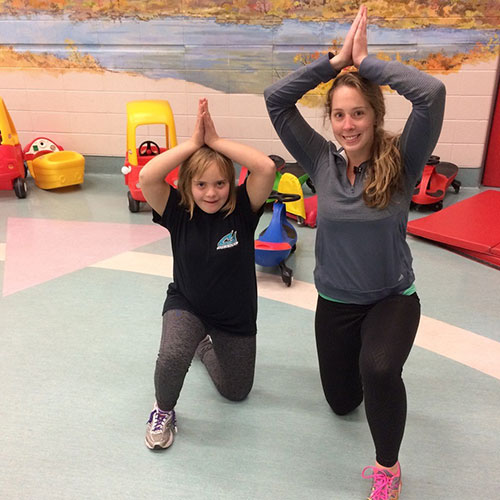We use cookies on this site to enhance your experience.
By selecting “Accept” and continuing to use this website, you consent to the use of cookies.
Search for academic programs, residence, tours and events and more.
One in five children in Ontario have a “special need”, such as Down syndrome, Autism, Attention Deficit Hyperactivity Disorder, or a learning disorder, to name a few. It is well known that children with special needs typically have a hard time in school, including physical education (PE) classes. Unfortunately, kids with disabilities tend to fall behind their peers in developing fundamental movement skills like walking, throwing, and catching, which can affect their physical, social, and cognitive development over time.
For example, an autistic child might feel uncomfortable in a PE class for many reasons (maybe it is too noisy, or the child is not interested in the activities), which leads her to sit on the sidelines whenever possible. Then at recess, she may choose not to play pick up soccer with her classmates because she does not know how to play or feels like she is not good at running or kicking. The kids playing soccer become closer friends over time, causing an even bigger gap between the social and physical skills of the autistic girl and her classmates. As a result, she becomes more isolated and has fewer opportunities to practice her physical and social skills.
My graduate work has centered on the experiences of families raising kids with disabilities. The goal of my research was to reduce gaps in physical and social skills though community programs inclusive to kids of all abilities. This began with a survey of community physical activity programs. Within the Region of Waterloo, there are many community programs, some of which accommodate kids with disabilities. I surveyed 128 families in total, including 253 children questions about physical activity in the Region of Waterloo. My survey results suggested the need for affordable programs and subsidized options for low-income families. While all families surveyed were interested in inclusive programming, families raising children with disabilities expressed significantly more interest in inclusive programming. Families raising typically developing children did not express this same interest.
 Movin’ and Groovin’ (M&G), a program created by myself and another PhD student in 2015, is one example of an inclusive and affordable program in the Region of Waterloo. M&G focuses on physical skills through personal fitness activities, group games, yoga, and dance. The program also develops social skills by partnering each child with a 1:1 volunteer, typically a university student. In 2018, I evaluated the program to determine whether it had any effects on participants.
Movin’ and Groovin’ (M&G), a program created by myself and another PhD student in 2015, is one example of an inclusive and affordable program in the Region of Waterloo. M&G focuses on physical skills through personal fitness activities, group games, yoga, and dance. The program also develops social skills by partnering each child with a 1:1 volunteer, typically a university student. In 2018, I evaluated the program to determine whether it had any effects on participants.
Analysis of parent surveys, volunteer focus groups, and observations from 10 video recorded classes revealed M&G was a positive experience for the kids and their families. For example, the mother of a young boy with autism said, “this program is unique and much needed in our community.” The videos documented kids in M&G spending (on average) more than half of the one-hour class in moderate to vigorous physical activity, which is double the 17 minutes an disabled child achieves during a regular school day (Sit et al., 2017). Additionally, the kids at M&G spent almost 45 minutes of class time interacting with others and/or doing the activity at hand, providing ample opportunities to develop social skills such as listening and responding to others. We worked to improve confidence in the kids at M&G by having them speak in front of the group (e.g., say your name and favourite game), lead an activity (e.g., teach the group a yoga pose), and show their skills (e.g., show a dance move you created).
To study the outcomes of M&G more closely, I also completed a case study about a young girl diagnosed with autism and anxiety. This participant showed improvements in physical and social skills after her first ten weeks in the program. When I interviewed her parents, her dad recalled a conversation with her teacher, who noticed differences at school although no other factors had changed in her life and her mother said, “I think she’s found her groove here.”
These findings demonstrate the importance of community physical activity programs like M&G; however, more research is needed. We need to know the specific physical and social outcomes of these programs for more than the small group of children studied, and if any of these outcomes last over a period of time. The implications of this research provide evidence for: (1) financial support of community-based physical activity, especially for low-income families; (2) emphasis on physical activity in school environments; and (3) research and knowledge translation regarding the far-reaching benefits of inclusive programming for children. I hope my research will help to make recreational programming more accessible for children with disabilities.
Nicole J. Luymes completed her PhD in the Department of Kinesiology. Her primary research interest is exploring the effects of community-based physical activity and dance programs for young people with developmental disabilities such as autism and Down syndrome.
Luymes has years of experience as a dance and fitness instructor, which led to her work co-creating an inclusive program called Movin’ and Groovin’. The unique program allowed Luymes to put her research into practice. She uses both quantitative and qualitative research methods to study health and wellness, and gain a wholistic understanding of inclusive physical activity for children and their families. Luymes previously completed her Master of Science in Kinesiology and Bachelor of Science from the Department of Health Sciences.